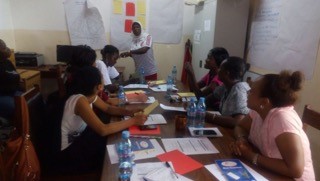Written by Judy Chang, Board Member, International Network of People who use Drugs
Globally, it is estimated that one out of three women experiences gender-based violence (GBV) in her lifetime. Data on women who use drugs and their experiences of violence are scarce; this is not surprising given our status as an invisible population. As a result of criminalization, discrimination, and stigmatization, women who use drugs are disproportionately affected by violence. Women who use drugs commonly experience violence at the hands of state actors, notably the police, and when violence comes from intimate partners and the wider community, it is often perpetrated with impunity.

Tanzanian Network of People who use Drugs. Photo by Ruth Birgin.
GBV against women who use drugs manifests as a result of a range of interrelated structural, systemic, and sociocultural drivers. Our experiences of GBV are both driven and compounded by stigma and discrimination and inequality. In 2015, the International Network of Women Who Use Drugs (INWUD), along with Women and Harm Reduction International Network, released a statement for the International Day for the Elimination of Violence against Women. The statement included a number of testimonials from women who use drugs and have been affected by violence. One woman shared her story.
“The insidious creep of abuse of domestic violence makes it hard to speak out. But when police fail to act on a charge, it becomes a double act of injustice. The neighbours called the police to my house, after I had just gone through a window. Under questioning he [my partner] told the police officer I was a drug user. Tearful and shaken, I found the tables turned on me. Rather than pursue a clear case of domestic violence, he chose to search me for drugs. It only took those two little words of ‘drug user’ for the police officer to see me not as a victim of domestic violence, but as a woman not deserving of equal protection under the law. At a time when I felt the most broken, I had to bear the force of a broken system which treats women who use drugs as undeserving of the same rights as other women.” (INWUD Virtual Consultation, 2015)
Our current value system that embraces prohibition places an inordinate amount of focus and effort on regulating and controlling what a woman puts into her body, rather than what is being inflicted on her body, more often than not by those with more power. Driven by political ideology and moral attitudes, the damage that the war on drugs wages on women’s bodies needs a political solution. INPUD argues that community organizing, community mobilization, and solidarity building remain the most effective and protective barriers against abuses and violations. Historically, we have seen these used as political tools to make critical gains in labor rights, civil rights, liberties, and in the HIV movement.
Ruth Birgin, INPUD’s Women’s Policy Officer has been catalyzing women who use drugs in countries in Asia and across Africa. She has been working with women from national drug user networks and supporting them to come together, develop plans and strategies to meet their community-defined needs, and create mechanisms for collective support. In Indonesia, for instance, INPUD supports the activities of PKNI, the national drug user network, that contributes to broader goals of increasing understanding and awareness of violence against women who use drugs and developing elements of protection. In Tanzania, INPUD’s Women’s Policy Officer is coordinating with women from the Tanzanian Network of People who use Drugs (TANPUD), who will be running their own activities, including a public event on December 10. A women’s advocacy team comprised of TANPUD members has been formed. They are currently developing a statement on violence against women who use drugs, which is to be presented to the Ministry of Community Development Gender and Children on the 2016 International Day for the Elimination of Violence against Women.
The upcoming years are crucial. As we prepare for increasing onslaughts on the rights of women worldwide—including sexual and reproductive health rights, the right to bodily integrity and self-determination, and the right to be free from violence and sexual assault—women who use drugs need to come together to organize and strengthen our networks and communities. This is the first, crucial step to challenging damaging political realities. Now more than ever, the status quo will no longer suffice.
Judy Chang (MIntDev) is a board member of INPUD; a consultant with Coact, which is a technical support agency specializing in HIV and drug use; and an MPhil Candidate at the National Drug Research Institute (NDRI) in Australia.
INPUD is a global peer-based organization that seeks to promote the health and defend the rights of people who use drugs. INPUD challenges stigma, discrimination, and criminalization of people who use drugs and the impact they have on the drug-using community’s health and rights. The International Network of Women Who Use Drugs is a subnetwork comprised of those who self-identify as women and who use drugs.
